Nightly Builds
You can find Nightly Builds of the software at: https://builds.apache.org/view/M-R/view/OpenMeetings/
These instructions are for 3.0.x version only
How to Build a Distribution
To build a binary release of OpenMeetings you need:
- Oracle JDK7
- Apache ANT (minimum) 1.8.3
- SVN Command line client (Subversion 1.7 required!) http://subversion.apache.org/packages.html
Get the source:
svn checkout https://svn.apache.org/repos/asf/openmeetings/application/branches/3.0.x
Run the command:
ant
There is no need to compile the client additionally! The ant task does it all! You will find a directory dist that contains OpenMeetings and a red5-server.
To compile the client you can also use ant:
ant # compiles a complete package into the folder dist
ant compile.laszlo.main # compiles the client into main.as3.swf10.swf and main.swf8.swf
ant compile.laszlo.main.debug # compiles the debug-client into maindebug.as3.swf10.swf and maindebug.swf8.swf
ant -Ddb=<name of DB> # will copy <name of DB>_persistense.xml to persistense.xml
#(for ex. ant -Ddb=mysql will set mysql as default DB)
To compile just the openmeetings JAR file:
ant jar.only
To run Junit tests using ANT see JUnitTesting
Run, Develop, Test
To develop or build OpenMeetings you checkout the source as Eclipse project. You need the Subclipse or Subversive Plugin for Eclipse. If you just need to change 3 lines of code then your probably better switch to How to build a distribution .
Step1 - Get required Software
To develop OpenMeetings you need at least:
- Eclipse in a up to date copy and Oracle JDK7
- Apache ANT (minimum) 1.8.3
- Subclipse 1.8 (Subversion 1.7 required!) http://subclipse.tigris.org/
- SVN Command line client (Subversion 1.7 required!) http://subversion.apache.org/packages.html
- Spring IDE for Eclipse (installable via Help > Eclipse Marketplace)
- Apache IvyDE™ For Eclipse (installable via Help > Install New Software) URL: http://www.apache.org/dist/ant/ivyde/updatesite detailed steps can be found here: http://ant.apache.org/ivy/ivyde/download.cgi
- MySQL (or Postgres, or other Databases supported by openJPA) are optionally but handy to have them
Step2 - Download the Source
Advanced Users: Check out the Code from the Repository as a Java project into Eclipse.
URL: https://svn.apache.org/repos/asf/openmeetings/branches/3.0.x/
To download the required JARs for building and developing OpenMeetings you need to run the ANT comand:
ant -Ddb=<your_DB> dist prepare-eclipse
After the ANT command you need to press F5 and rebuild the project from inside Eclipse
Step-By-Step:
1) Start Eclipse
2) Change Perspective to SVN Repository Exploring:
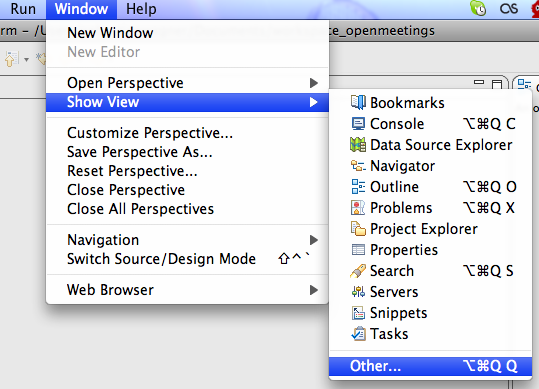
3) Select SVN Repository Exploring and click ok.
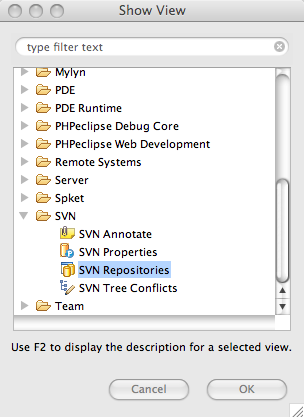
4) A new Dialog in Eclipse opens SVN Repositories

5) Click on the icon with the plus in the top right corner in the SVN Repository Dialog
![]()
6) Add the URL https://svn.apache.org/repos/asf/openmeetings/branches/3.0.x/ and click Finish
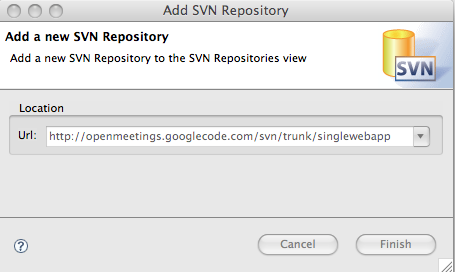
7) After download is complete you see a new Source Repository in the Repository Explorer. Right click on it and choose checkout
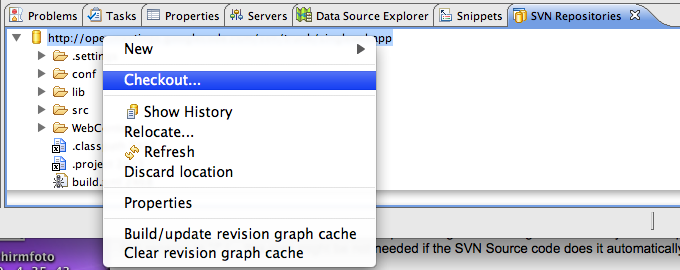
8) In the Dialog the opens now just click next

9) In the next Dialog just click Finish, Eclipse will then download the sources
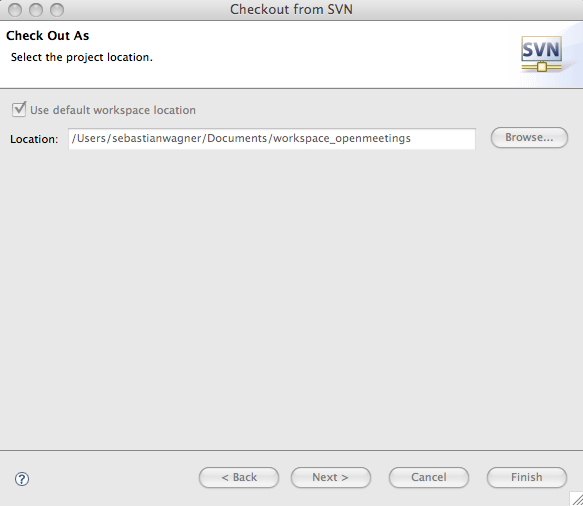
10) After the download is complete you will see a new Project in the Package Explorer Dialog of Eclipse
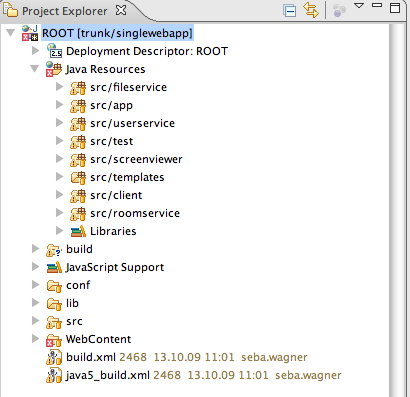
ant dist prepare-eclipse
Step3 - Deploy and Run
see the first chapter about the ANT tasks to compile the code. You will find a directory called dist which contains a regular openmeetings including red5. You can then use the usual process like described at installation to run the code then.
Links
- Getting Started with OpenLaszlo, checkout Laszlo-in-10-Minutes and the Application Developer's Guide or try the ScreenCast
- browse SVN source
Tips and Gotchas
When you want to develop only client side there are handy ANT tasks so that you only rebuild the SWFs, same for the Java side.
It also takes much less time if you do use MySQL as database then rebuilding the software and waiting for Apache Derby to set up the database everytime you did rebuild.
Working behind a proxy: If you are sitting behind a proxy you should add some proxy settings before starting the build process.
For Apache Ivy see: http://ant.apache.org/ivy/faq.html
For SVN Command Line Client (From CollabNet 1.7) see: https://ctf6latest.collab.net/internal-help/index.jsp?topic=/teamforge610/faq/client_proxy_settings.html

